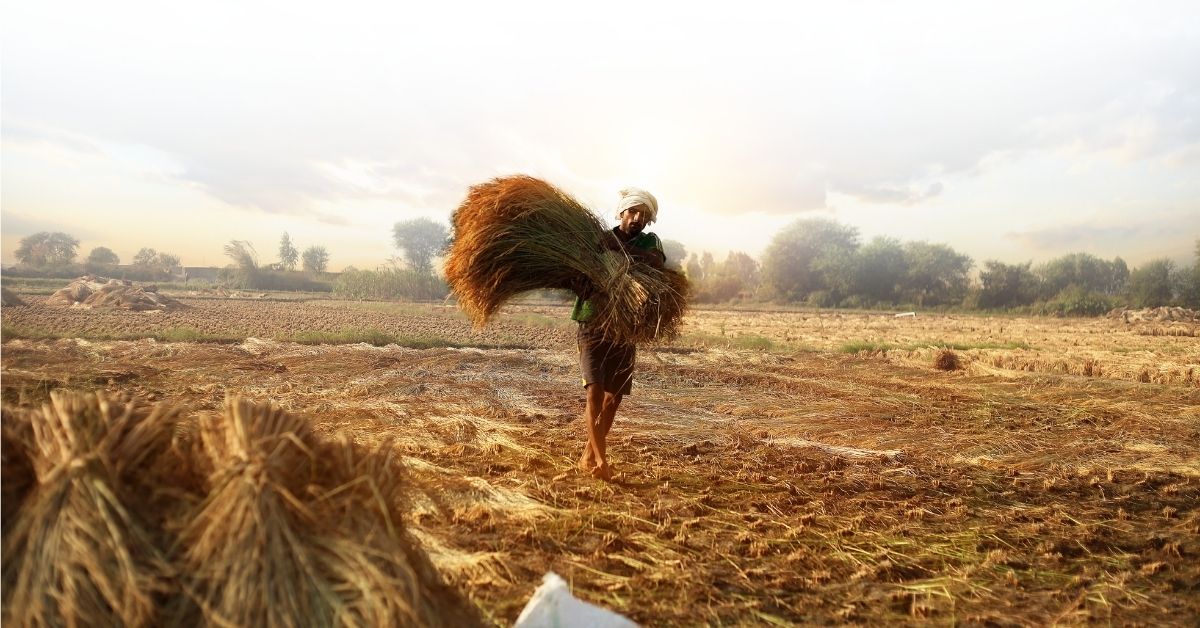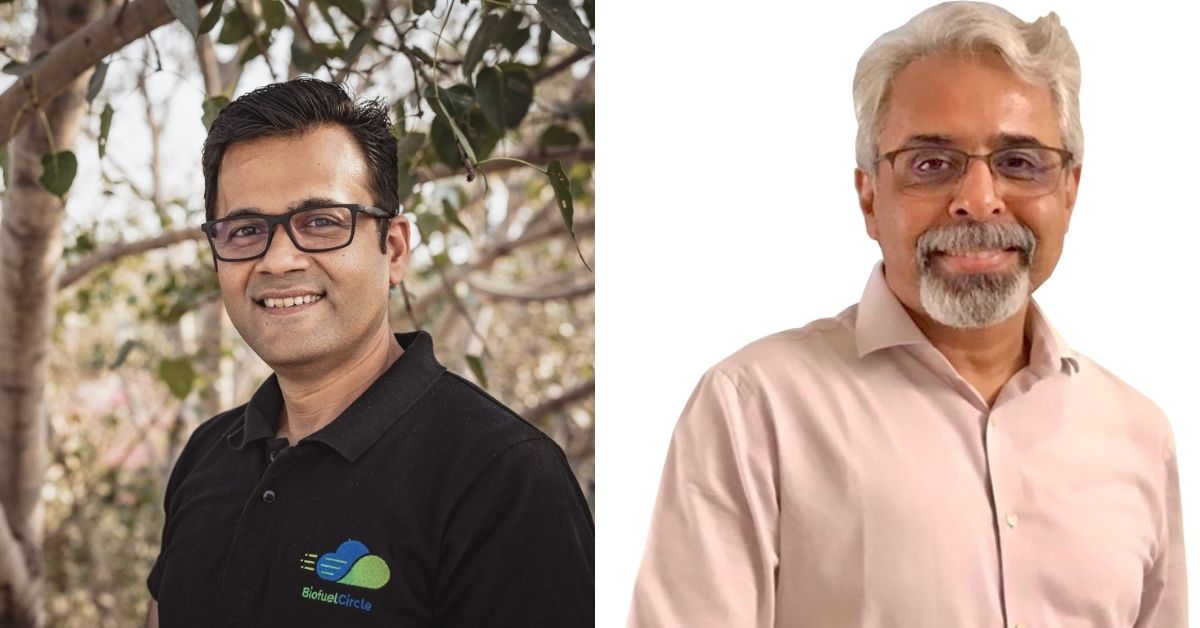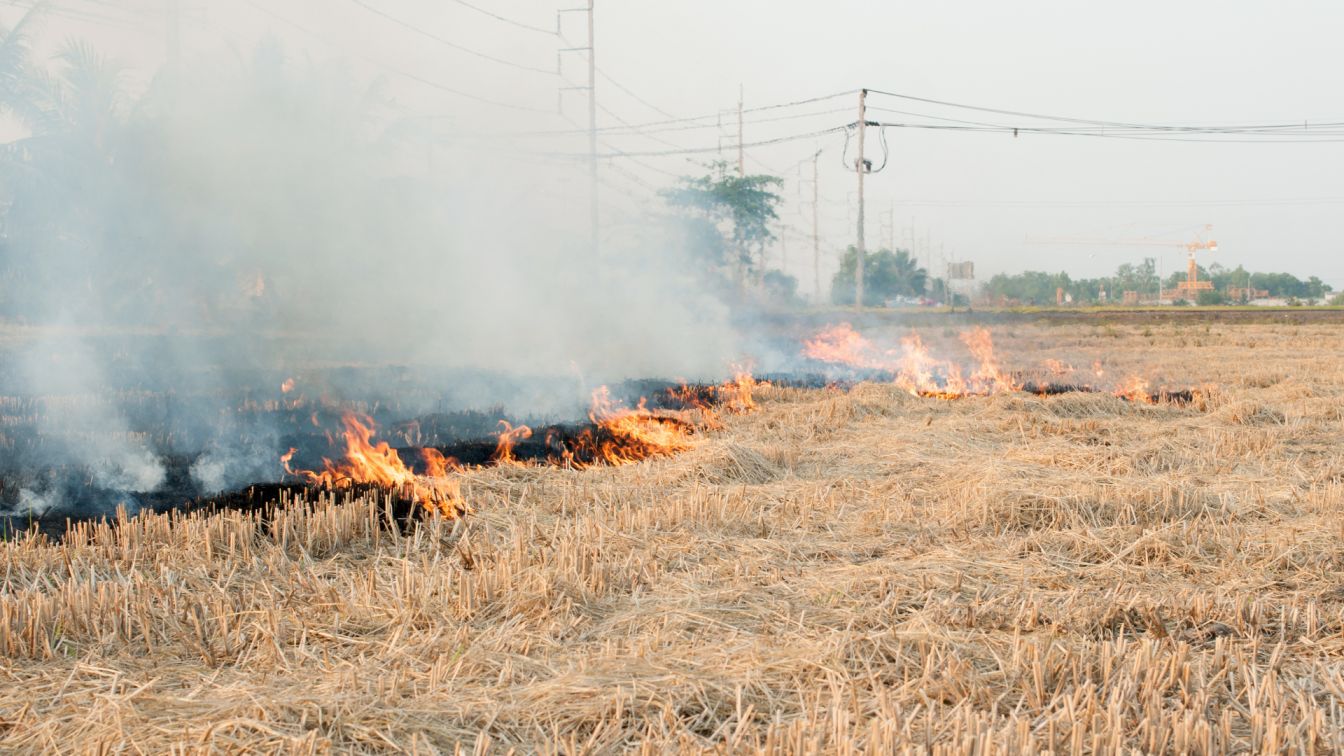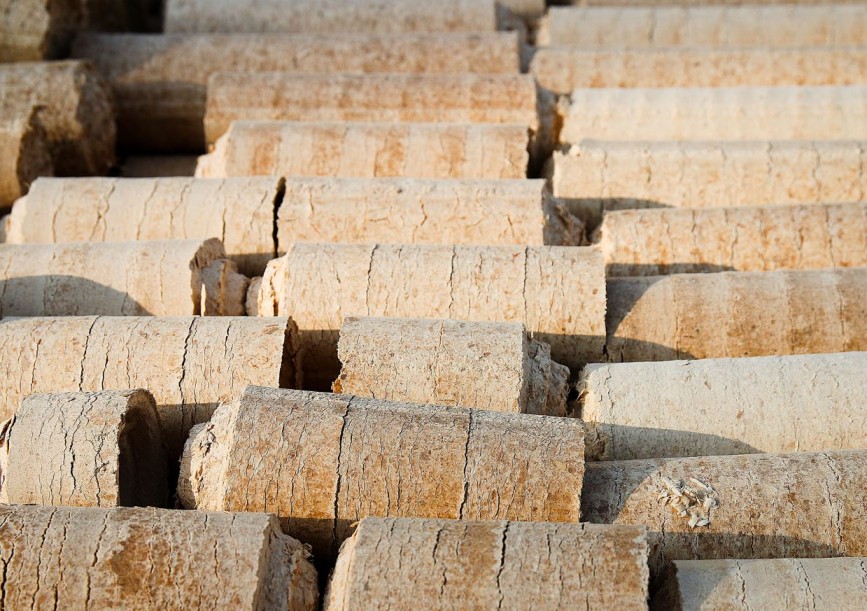How an Online Marketplace Prevented 25,000 Metric Tonnes of Stubble from Being Burnt
Pune-based BiofuelCircle, founded by Suhas Baxi and Ashwin Save in June 2020, is an online marketplace for biomass and associated commodities (biofuel, biofertilizers, biogas) that connects the rural farming community with industrial producers. Here's how they're reducing stubble burning and generating a clean energy source.

“Why would farmers spend money, time, and effort to clear their land of stubble and sell it for almost nothing? They’d rather burn it and get it out of the way.”
The astute Mr Arjun Bankar, the technical consultant of Amrit Sanjeevani Farmer Producer Organisation, briefly sums up the sentiments of the people he represents. With clarity and confidence, the man sitting across from him tells Bankar that farmers should be doing just that — spending time, money, and effort to clear their land of stubble, with one crucial twist.
Ghule works for BiofuelCircle, a Pune-based company that claims a bold mission to bring bioenergy out of its disorganised adolescence into a thriving, mature adulthood. The online marketplace for biomass and associated commodities (biofuel, biofertilizers, biogas) connects the rural farming community with industrial producers.
The company was founded in June 2020 by Suhas Baxi and Ashwin Save who were brought together by a shared calling to transform conventional businesses through intelligent digitalisation. When the former ex-colleagues began working on their idea, they were surprised to realise the depth of social and environmental impact it could create. This boosted their resolve and BiofuelCircle was born.

The idea seems simple, but inefficiencies in the value chain of biomass seriously complicate the work of BiofuelCircle. The raw material for bioenergy exists in abundance, the conversion technology is widely understood, and the need for renewable energy grows every day. So it’s a wonder that any bio-waste in India gets wasted or burnt, let alone 200 million tonnes of it. If India’s bioenergy sector took in all this unused biowaste, it could power 17% of the country’s energy needs.¹
The reason that agro-waste has not successfully entered the bioenergy supply chain is, as Bankar explains, because the value of loose crop residue is not worth the cost of collecting and transporting it. If a farmer decides to sell her waste to an industrial bioprocessing unit, she will first need to use time and labour to clear the land. Then, she will need to transport it to a processing plant. Crop residue is very voluminous. A farmer will have to use many trucks to transport a few tonnes of bio-waste, spending so much on fuel that the entire endeavour puts her at a great loss. Similar calculations of loss prevent existing bioprocessing plants from collecting biowaste from farms.
But a system of collectivism can overcome this problem. To increase their bargaining power, farmers organise themselves into collective units, popularly called Farmer Producer Organisations (FPOs). BiofuelCircle dreams for FPOs to function as rural bioprocessing enterprises. Here’s how such an enterprise would work. First, the farmer uses tractors to collect the waste from his land. Then, through the established transport networks of the FPO, a farmer can bring this biowaste to a centralised space. Finally, the FPO sets up a briquette plant that compresses this bio-waste into easily transportable briquettes.
The value of loose biomass doubles when it becomes a briquette. “Why should the farmer, who owns the biomass, give away his opportunity to profit from it to an industrial enterprise? With just a little organisation, we can bring the enterprise to the farming community.” says co-founder of Biofuel Circle, Suhas Baxi. In one stroke of organisation, BiofuelCircle hopes to set up thriving rural enterprises and overcome the existing bottleneck in the supply of biomass.
“How do we put up the investment for this plant? You are telling me a briquette machine will cost us Rs 25 lakh, not to mention the cost of maintenance and labour. How can we ask farmers to support such a risk?” asks Bankar, determined not to get his hopes up in vain.
Ghule assures him that his FPO will have adequate financial and technical support at every step. To achieve this, BiofuelCircle has partnered with financial aid agencies, government schemes, and NGOs. Moreover, the online digital platform will provide the rural briquette plants with instant and easy access to credible consumers of biomass. An FPO can negotiate prices, manage transactions, organise collection drives and receive payments with transparency, all on a single app.
To begin operations, an FPO needs only one briquette machine capable of producing 10-20 tonnes worth of briquettes a day. Such a plant would employ 2-3 people and generate an annual turnover of Rs 2 crore to Rs 2.5 crore. “The FPO would gain a return on capital investment in less than 18 months. The average farmer who owns about 2 acres of land can supplement his annual income by about Rs 10,000 -15,000 or, as I love to say, how much it takes to have two kids in school,” says Ashwin Save, co-founder of BiofuelCircle.

During their pilot project in Maharashtra in May 2021, BiofuelCircle was surprised to see farmers excited and willing to use the online platform despite having low technical literacy. On the contrary, industrial players with a better grasp of technology and the bioenergy sector were less welcoming of the change. A big industrial plant has to coordinate with many biomass suppliers, negotiate prices, schedule deliveries, and ensure people respect commitments and deadlines. When the process becomes digital, all of these functions are taken care of with minimal haggling and follow-ups. For industries, this rise in efficiency will change the way they do business, and many are understandably apprehensive. Existing bioprocessing units may have to redefine themselves to remain relevant in the face of more efficient rural players. However, Baxi believes that, in the long run, existing biomass processors will benefit as the scale of the industry grows. If they adapt to this change and welcome the opportunity to diversify their role in bioenergy, their role will significantly expand.
BiofuelCircle also steps in to transport biomass to its industrial buyers and deliver biofertilizers back to the farms. This intervention reduces the number of empty rides a truck has to make by combining deliveries located in a similar region. In addition, BiofuelCircle uses trucks with a moving floor to quicken the process of unloading briquettes.
In 5 minutes, these trucks can unload 30 tonnes of biomass briquettes, a job that would take manual labour over 6 hours. This dual intervention by BiofuelCircle stands to bring down the cost of biomass by more than half, making it a significantly more attractive commodity.

BiofuelCircle’s solutions are pervasive and display keen attention to detail. If all goes according to plan, everyone in the biofuel supply chain wins. Farmers receive extra income, rural entrepreneurship grows, industries increase their output, stubble burning reduces, and the country gains energy security. Currently, BiofuelCircle works with a dozen FPOs and has over 1,500 active farmers using the digital platform. Since the pilot project in 2021, over 25,000 MT of biomass has been traded on the platform.
However, BiofuelCircle is only two years old and still must prove the on-ground viability of its concept. Their success will depend on their ability to deliver on their promises to FPOs. It will also depend on their ability to convince industrial players to use and stay committed to the Biofuel Circle’s platform despite obvious disruptions to their business.
BiofuelCircle currently operates in 3 states — Maharashtra, Gujarat, and Tamil Nadu, but hopes to expand across India and beyond. “We have been able to attract investment as a fledgling business because no one thought that a for-profit company could create a model for such sweeping intervention and social change. As a result, we’ve been able to hire talented, passionate professionals and are working toward scaling our business,” says Baxi.
With a looming energy crisis, it becomes crucial for India to reach greater energy security through renewable sources. “As long as there are humans on earth, there will be food, and with it, food waste. The flow of bioenergy will never diminish, and our farmers will always have access to a reliable stream of income.” As this realisation dawned on Mr Bankar, his hopeful excitement was palpable. He and his people have a chance to secure a place in the future and a new way of doing things.
Written by Jahnavi Jethmalani; Edited by Yoshita Rao
If you found our stories insightful, informative, or even just enjoyable, we invite you to consider making a voluntary payment to support the work we do at The Better India. Your contribution helps us continue producing quality content that educates, inspires, and drives positive change.
Choose one of the payment options below for your contribution-
By paying for the stories you value, you directly contribute to sustaining our efforts focused on making a difference in the world. Together, let’s ensure that impactful stories continue to be told and shared, enriching lives and communities alike.
Thank you for your support. Here are some frequently asked questions you might find helpful to know why you are contributing?


This story made me
-
97
-
121
-
89
-
167











